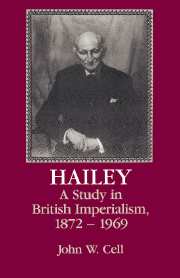Book contents
- Frontmatter
- Contents
- List of abbreviations
- Glossary of foreign words
- Preface
- 1 Early life
- 2 Colonization officer, 1901–1906
- 3 From Sargodha to Delhi, 1907–1912
- 4 Chief commissioner of Delhi, 1912–1918
- 5 A report on the Punjab
- 6 Finance member, 1919–1922
- 7 Home member, 1922–1924
- 8 Governor of the Punjab: the Sikhs, 1924–1925
- 9 Governor of the Punjab: the communal problem, 1924–1926
- 10 Governor of the Punjab: the communal problem, 1927–1928
- 11 Governor of the United Provinces, 1928–1930
- 12 Governor of the United Provinces: civil disobedience and Round Table Conference, 1930–1931
- 13 Governor of the United Provinces: 1931, year of crisis
- 14 Governor of the United Provinces: winding down, 1932–1934
- 15 Surveyor of Africa, 1935–1939
- 16 Two missions to Africa, 1939–1940
- 17 A report and a vision, 1941–1942
- 18 Adviser and propagandist, 1942–1945
- 19 Indian partition and the onset of African decolonization, 1945–1949
- 20 Defender of the faith, 1949–1969
- Bibliography
- Index
11 - Governor of the United Provinces, 1928–1930
Published online by Cambridge University Press: 12 October 2009
- Frontmatter
- Contents
- List of abbreviations
- Glossary of foreign words
- Preface
- 1 Early life
- 2 Colonization officer, 1901–1906
- 3 From Sargodha to Delhi, 1907–1912
- 4 Chief commissioner of Delhi, 1912–1918
- 5 A report on the Punjab
- 6 Finance member, 1919–1922
- 7 Home member, 1922–1924
- 8 Governor of the Punjab: the Sikhs, 1924–1925
- 9 Governor of the Punjab: the communal problem, 1924–1926
- 10 Governor of the Punjab: the communal problem, 1927–1928
- 11 Governor of the United Provinces, 1928–1930
- 12 Governor of the United Provinces: civil disobedience and Round Table Conference, 1930–1931
- 13 Governor of the United Provinces: 1931, year of crisis
- 14 Governor of the United Provinces: winding down, 1932–1934
- 15 Surveyor of Africa, 1935–1939
- 16 Two missions to Africa, 1939–1940
- 17 A report and a vision, 1941–1942
- 18 Adviser and propagandist, 1942–1945
- 19 Indian partition and the onset of African decolonization, 1945–1949
- 20 Defender of the faith, 1949–1969
- Bibliography
- Index
Summary
“I naturally cannot help feeling an intruder here,” Sir Malcolm Hailey confessed in August 1928, shortly after he took over as governor of the United Provinces of Agra and Oudh. Knowing his new colleagues would resent the appointment of an outsider, he referred frequently to his older brother's long service in the local land and revenue department. Although the Punjab and UP shared a common boundary, Lahore was 750 miles from Lucknow, the capital of Oudh (now Awadh), and 1,000 miles from the capital of Agra, Allahabad. UP was smaller in area than the Punjab, ranking eighth among the Indian provinces. At 50 million, however, including princely states, it had nearly twice the population, a figure second only to Bengal and 10 million more than that of England and Wales. Although UP possessed more prominent cities – Benares (now Varanasi), Aligarh, Cawnpore (now Kanpur), and Agra, as well as the two capitals – it too was predominantly agricultural, with 90 percent of its people living in rural areas.
As he settled into his beautiful summer capital at the hill station of Naini Tal, Hailey discovered some important contrasts. Whereas water rates from canal colonies in previously unproductive desert areas had provided the Punjab a financial bonanza, in UP the vast Sarda canal project was bringing water to districts that were already under cultivation, so the revenue outlook looked relatively bleak. He was struck by differences in protocol.
- Type
- Chapter
- Information
- HaileyA Study in British Imperialism, 1872–1969, pp. 155 - 167Publisher: Cambridge University PressPrint publication year: 1992



